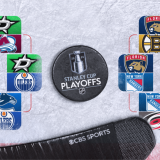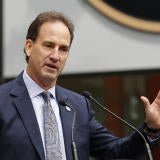
More NHL Offseason: NHL rumors | Rumor mill | Trade Tracker | 2014-15 preseason odds
One of the most contentious contract negotiations of the summer has come to an end. Ryan O’Reilly and the Colorado Avalanche have agreed on a two-year deal worth $12 million according to multiple reports. The two sides avoid a potentially messy arbitration hearing, which came after the Avalanche filed for rarely-utilized team-elected salary arbitration option.
O’Reilly is coming off a career year in which he put up 28 goals and 64 points, while playing an integral two-way role for the Avalanche. The 23-year-old forward already has five years of NHL service under his belt, so he will be eligible to become an unrestricted free agent at the end of this deal that will come with an annual cap hit of $6 million.
The Avalanche were in tough talks with O’Reilly after his qualifying offer would have had to be $6.5 million. The team elected for salary arbitration to try to knock that number down as it was the result of an unfavorably structured offer sheet O’Reilly signed with the Calgary Flames two years ago while holding out on the Avalanche. Colorado matched that sheet and kept O’Reilly in the Mile High City, but that set the stage for the contentiousness this summer.
The second year of that deal thanks to the offer sheet paid O’Reilly $6.5 million. The Avs reportedly were seeking an 85 percent decrease in arbitration, to get O’Reilly’s deal down to a more manageable $5.525 million deal. O’Reilly’s pre-arbitration ask was reportedly $6.75 million.
The fact that he was coming of a career year in which he earned $6.5 million clearly complicated things.
O'Reilly won the Lady Byng Trophy last year after taking just one minor penalty all season, tying an NHL record. Additionally, O’Reilly was solid in possession despite the Avs being a rather dreadful puck-possession team despite some incredible success in the standings, not to mention career highs in goals and points.
Now that the tough negotiation is out of the way, the Avalanche can breathe easy for now. There was wide belief that a second acrimonious negotiation between the two parties would force O’Reilly out of Denver. It clearly hasn’t come to that as the two sides have met at a highly reasonable middle ground.
O’Reilly has been a terrific pro for the Avs over his five years with the club, which boasts a young core of players that could lead the team to many years of success in the future.
O'Reilly joins forward Matt Duchene as the only two players with a cap hit of $6 million or more on the Avalanche. Those two, along with captain Gabriel Landeskog who is under contract until 2021 and Nathan MacKinnon, who still has two years left on his entry-level deal, represent a formidable quartet of young forwards that would be the envy of many teams around the league.
The Avalanche are still leaving themselves a little risk here with a two-year deal considering O’Reilly can reach free agency in his first year eligible, but this is a deal that had to get done.
The question the entire time in this ordeal was “How much is O’Reilly really worth?” The Avalanche, by filing for team-elected arbitration essentially said for all the world to see, not $6.5 million. That may be a fair assessment, but the fact that the compromise ended up being a difference of $500,000 on average per season shows that there probably could have been more done to avoid the difficulties in negotiation before it got to this back-against-the-wall situation.
Executive vice president of hockey operations Joe Sakic was not in charge when the Avalanche matched O’Reilly’s offer sheet two years ago, but he probably would have done the same as Greg Sherman, who is still the team’s general manager with diminished authority. Believing that he would have done anything differently than Sherman the last time around doesn't seem prudent considering how things went now. The team didn't learn from its prior mistake.
The team lost a lot of face in that last bout that saw O’Reilly stay in the KHL even after the lockout ended in 2012-13. That ordeal stretched into March, nearly half of the lockout-shortened season.
That set the stage for another tough summer and up until this deal was made, it seemed destined O’Reilly’s next contract would be decided by the arbitrator. In that hearing, the Avs would have had to eviscerate one of their young talents to essentially save themselves $1 million, creating further contentiousness between the two sides.
Should it have gotten to that point, O’Reilly had the power to accept a one-year award, which he had reportedly planned to do. That would have started this situation all over again and very easily could have ended in O'Reilly asking out of town.
Though an agreement has been reached, this was still a bit of a damaging process for Avalanche management. Twice now they have been locked in contentious negotiations with a player that is homegrown and plays an important role on the team.
The question should have never been how much is Ryan O’Reilly worth relative to the rest of the league. It should have been how much is he worth specifically to the Avalanche and could they afford to go on without him? The answer to that second question was no, at least not over $500,000-plus in difference. The question about his value ended up being almost directly in between of what the two parties wanted out of the arbitration hearing.
Teams can’t give players everything they want. That’s not how negotiations work, but key players probably don’t deserve to get dragged through a process like this, definitely not twice.
It also calls into question this notion of a player not wanting to abide by a team-friendly deal. As much as that player may like playing there, it's not his problem if a team can't meet what he feels he is worth.
Asking players to take a “hometown discount” is something that has become all too casual in the sports world. Why is it rarer for teams to reward loyalty and the contributions of an individual to the success of the organization?
Considering the Avalanche were still a bad possession team even with a good possession player like O’Reilly underscores their need for him. Take him out of the lineup and what do you have then? Worse, take him and the already departed Paul Stastny out of the lineup and the Avs could have been back to square one on the road to rebuilding here.
Ryan O’Reilly is not the team’s best player, but he’s an important piece of the team and one of the five or six players Colorado has to continue building around. That's worth paying a little extra for.
O’Reilly had as much to do with last year’s finish atop the tough Central Division as anyone else outside of Semyon Varlamov.
The Avs are lucky to have gotten this done without further acrimony. They’re a better team with O’Reilly, but in two years they may have to go through this all over again. Only next time, O’Reilly has the leverage of being able to walk for nothing. For the sake of the organization's seemingly bright future, they better not make the same mistake thrice.





















